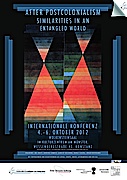After Postcolonialism: Similarities in an Entangled World
4. October 2012
International Conference
The discourse of cultural studies in the past decades is in many ways a reaction to fundamental geo-political shifts. De-colonization after WWII was accompanied by a postponed loss of meaning; first for Europe, and then for the West as a whole, as a cultural and ideological center. It became increasingly implausible to regard the history of humanity as culminating in and corresponding to the teleological systems of world history of the long nineteenth century: alternatively Christianity, the racial superiority of white populations, occidental rationality, or even Western achievements such as the Enlightenment and democracy. Cultural studies have attempted to break the accustomed hierarchies by placing the encounter between members of different cultures under the banner of the experience of difference and alterity.
However, even the postcolonial stress on alterity is ironically trapped within colonial idioms of thought. In order to respect a person’s difference, according to some postcolonial ways of thinking, one first has to declare this person as another, which means one has to make her an Other to a certain degree.
The discourse of alterity is, nolens volens, also a discourse of alterization. Acceptance and communication, in this schema, are based on the implicit premise of difference. But difference is logically bound to its antonym: identity. The idea of a radical difference between cultures calls up, in a complementary manner, the idea of a closed, homogenous identity – even if the expressed goal consists in its overcoming.
Both have become questionable: The “Clash of Civilizations” just as much as the presumption of a cultural identity, which seems increasingly inadequate in a present characterized by streams of migration. Due to this fact, a way out of the dichotomy of identity and difference, out of the strict either-or of ‘the own’ and ‘the foreign’, must be found.
Are actions necessarily constrained by such alternatives, or are they in most cases based on a much broader spectrum of options? Is there, apart from thinking in differences, an area where we can think in terms of ‘this, as well as that’, instead ‘of either or’, a philosophy and performative attitude of making similar, becoming similar, being similar?
The aim of the conference is to examine the historical reach of the category of ‘similarity’ by revisiting its historical and systematic implications. In this endeavor, one has to remember that “similarity” is not only a heuristic concept, but that it also works as an argument and as a performative option on the level of cultural practices.
Further reading
Anil Bhatti/Dorothee Kimmich/Albrecht Koschorke/Rudolf Schlögl/Jürgen Wertheimer: Ähnlichkeit. Ein kulturtheoretisches Paradigma. In: Internationales Archiv für Sozialgeschichte der deutschen Literatur, 36, 1 (2011), 261-275.
Programme and further information can be found on the conference website.
Thu-Sat, 4-6 October 2012
Konstanz, Wolkensteinsaal im Kulturzentrum Wessenberg
Contact
Nicole.Falkenhayner[at]uni-konstanz.de
in cooperation with Fritz Thyssen Foundation
